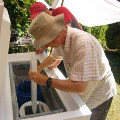Renewable energy and raw materials for cooling
 RELOAD scientists based at the Department of Agricultural Engineering (University of Kassel, Germany) study various cooling-related technologies based on renewable energy and raw materials.
RELOAD scientists based at the Department of Agricultural Engineering (University of Kassel, Germany) study various cooling-related technologies based on renewable energy and raw materials.
A variety of smart applications will increase the choice of cooling technologies available, support innovation and enhance efficiency in the food value chains addressed in the RELOAD project. Current R & D-activities comprise four cooling-related topics:
Solar powered fridges are developed particularly for milk and other short-life food products. A particular challenge relating to their use is to ensure an optimum storage temperature also at night, when solar power is not available. That is why ice cartridges, produced during daytime, can be used as ‘batteries’ (TRL 5).
For bigger storage volumes, cold storage buildings are required. The Agricultural Engineering Research Group developed a new concept for insulated storage wall construction, based on renewable materials. A particular challenge in this attempt was to deal with moisture diffusion, as the inner cold side of cold storage wall constructions will provoke precipitation of humidity, which most renewable materials do not tolerate. The successfully tested new concept is now ready for full-scale prototyping (TRL 4).
Evaporation cooling is a traditional and widespread concept to provide cold for storage purposes. Nevertheless, most of the known traditional concepts show poor performance due to low efficiency and lack of thermal insulation. The Agricultural Engineering Research Group is currently performing numeric modeling in order to find an optimized design for a least cost cold storage set up (TRL 2).
Highly perishable products like milk and meat require an undisrupted cold chain. Chilled transport represents an important aspect of successful cold chains. The Agricultural Engineering Research Group is currently developing concepts for reefer trailers for low-cost, small-scale transport (TRL 1).






